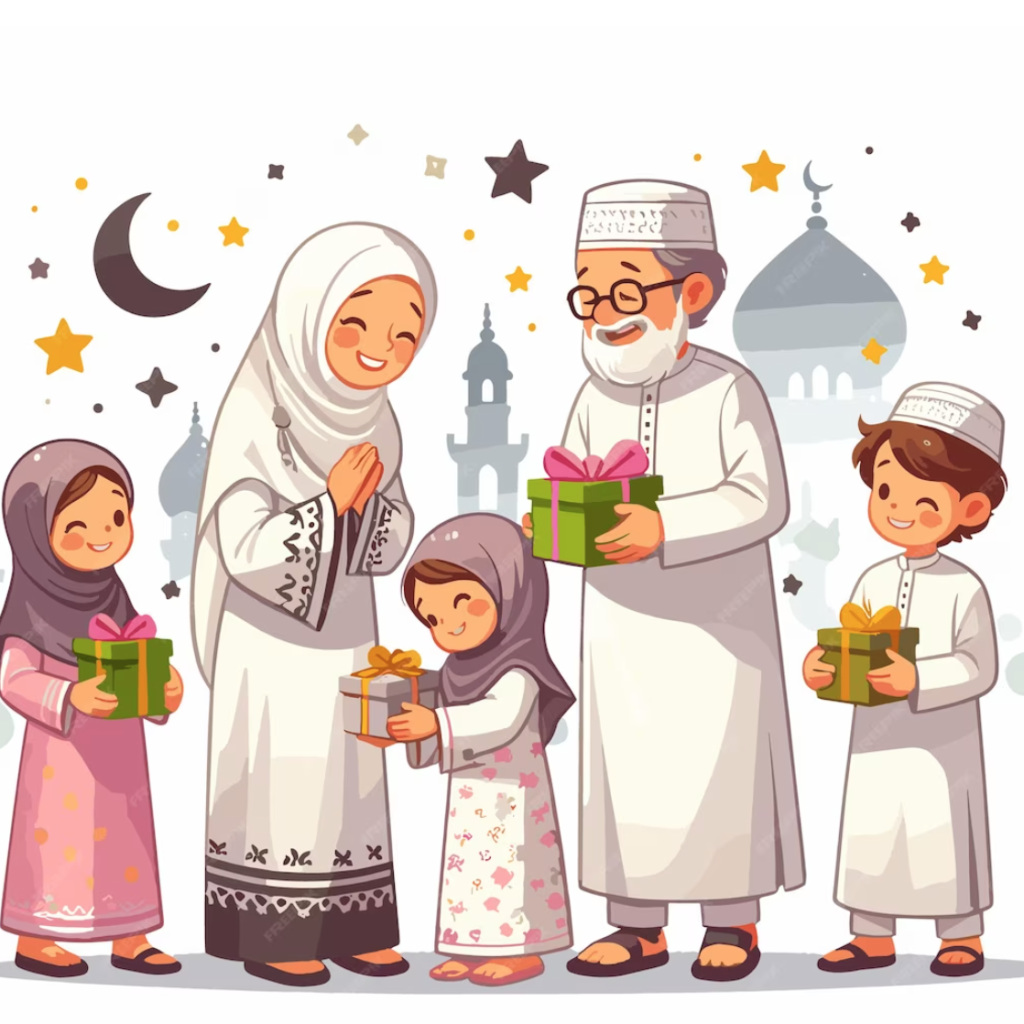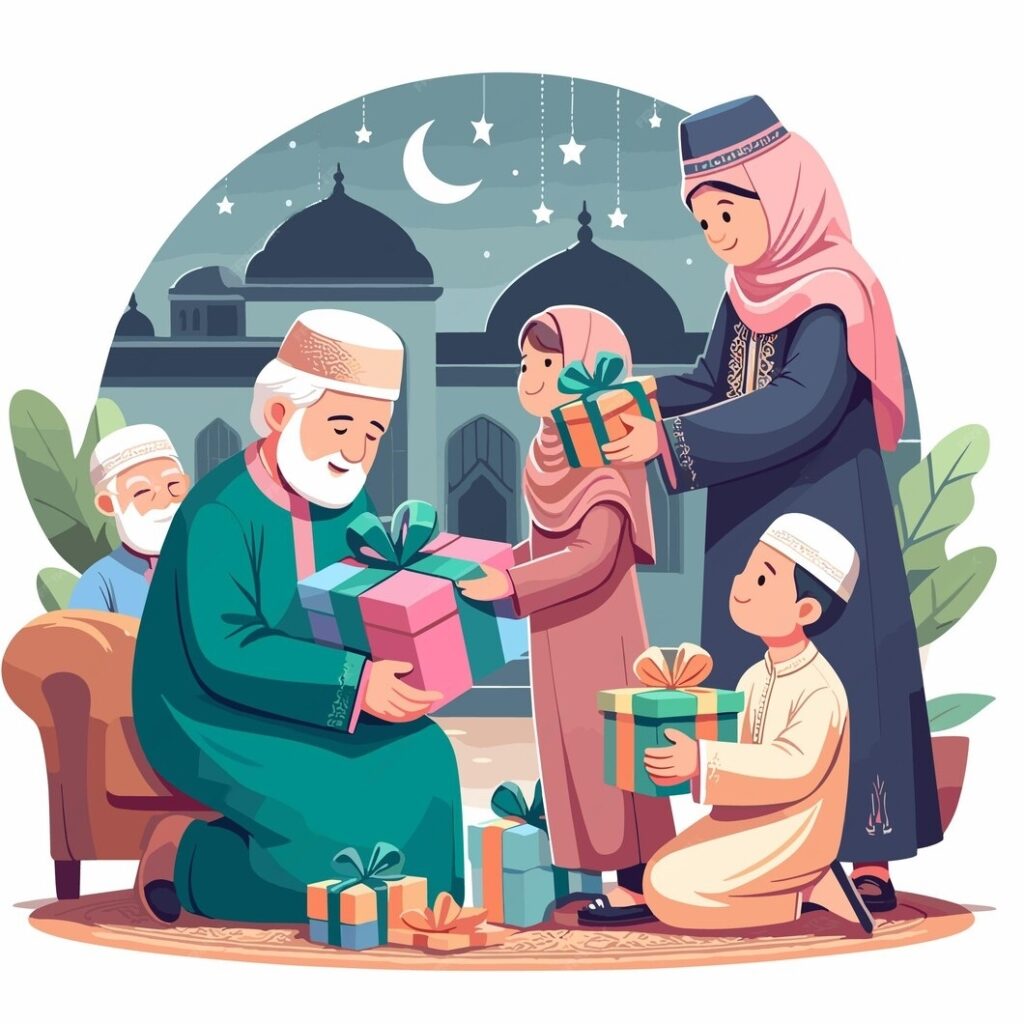Eid al-Fitr, a joyous occasion marking the culmination of Ramadan, holds profound significance in Islam. After a month-long period of fasting, prayer, and self-reflection, Muslims around the world come together to celebrate this special day. It serves not only as a time of festivity but also as a reminder of the spiritual journey undertaken during Ramadan. The essence of Eid al-Fitr lies in the renewal of faith, the expression of gratitude, and the strengthening of bonds within the Muslim community.
Unveiling the Meaning of Eid al-Fitr
Eid al-Fitr, often translated as “the festival of breaking the fast,” signifies the conclusion of the month-long fasting period of Ramadan. This celebration holds immense significance for Muslims worldwide as it marks the end of a period of spiritual discipline and devotion to Allah (SWT). Throughout Ramadan, Muslims abstain from food and drink during daylight hours, engaging in prayer, self-reflection, and acts of charity. The observance of fasting serves as a means to deepen one’s connection with Allah (SWT) and to purify the soul.
Ramadan itself holds a special place in Islamic tradition as it was during this month that Prophet Muhammad (PBUH) received the revelation of the Holy Qur’an. Muslims spend the month studying and reflecting on the teachings of the Qur’an, seeking guidance and spiritual enlightenment. Eid al-Fitr, therefore, serves as a joyous culmination of this period of devotion and self-restraint.
On Eid al-Fitr, Muslims gather with family and friends to celebrate and express gratitude for the blessings bestowed upon them. It is a time of joy, generosity, and communal unity as loved ones come together to share meals, exchange gifts, and engage in acts of charity. Through the festivities of Eid al-Fitr, Muslims reaffirm their faith and strengthen their bonds with their communities, embracing the spirit of love, compassion, and gratitude.
Understanding Eid al-Fitr
Eid al-Fitr serves as the culmination of the month-long fasting period of Ramadan, signifying a time of spiritual fulfillment and communal joy for Muslims worldwide. This sacred occasion holds deep significance in the Islamic calendar, representing a moment of celebration and gratitude for the blessings bestowed upon believers by Allah (SWT).
In the Islamic (Hijri) Calendar, two days are dedicated to the celebration known as Eid. Eid al-Fitr occurs annually after Ramadan, while Eid al-Adha takes place on the 10th, 11th, and 12th of Dhul Hijjah, the last month of the Islamic year. Each Eid holds its own unique significance and rituals, but Eid al-Fitr stands out as a time of rejoicing and coming together with family and loved ones.
The Spiritual Significance of Eid al-Fitr
Muslims celebrate Eid al-Fitr to honor their dedication and self-discipline demonstrated during the month-long fasting period of Ramadan.Throughout Ramadan, believers abstain from food and drink during daylight hours, adhering to the commandments of Allah (SWT) as a means of deepening their spiritual connection and demonstrating obedience. This period of fasting is not merely a physical exercise but a profound spiritual journey marked by worship, prayer, and acts of charity.
Eid al-Fitr serves as a joyous occasion to commemorate the successful completion of Ramadan and the hard work undertaken in the pursuit of spiritual growth. It is a day of celebration and gratitude, a beautiful gift from Allah (SWT) to believers who have dedicated themselves to acts of worship throughout the holy month. Through the festivities of Eid al-Fitr, Muslims express their appreciation for the blessings received and reaffirm their commitment to living a life guided by faith and devotion.
How to celebrate Eid?
Eid is a time for jubilation and gathering with family and friends, marked by moments of rest and blessings. During this auspicious occasion, Muslims are encouraged to engage in various acts to enhance the significance of the day:
1. Pray Eid Prayer: It highly recommends every Muslim to perform the Eid prayer in congregation with their fellow community members, expressing gratitude to Allah (SWT) and fostering unity.Following the Sunnah of the Prophet (peace be upon him), Muslims embark on a different route to and from the Eid prayer venue, symbolizing diversity and change.
2. Dress in Finery and Exude Fragrance: Eid is an occasion to adorn oneself in the finest attire, perform ritual ablutions, and wear pleasant fragrances. By doing so, Muslims honor the sanctity of the day and radiate positivity and joy within the community.
3. Exchange Gifts and Spread Happiness: Sharing gifts and offering congratulations are integral aspects of Eid celebrations, reflecting the spirit of generosity and camaraderie prescribed by Allah. Through the exchange of tokens of appreciation, Muslims strengthen bonds and foster goodwill among family and friends.
4. Engage in Du’a and Worship: Eid serves as an opportune moment for Muslims to engage in fervent supplications and acts of worship, drawing closer to Allah (SWT) and seeking His blessings. It is a time to reflect on one’s spiritual journey and express gratitude for the blessings received throughout the year.
On the Day of Eid, the Prophet (peace be upon him) used to return after offering the Eid prayer in a way different from that by which he went.
Hadith | Sahih al-Bukhari

The Story Behind Eid al-Fitr
Eid ul-Fitr, also known as the Festival of Breaking the Fast, traces its origins back to the time of Prophet Muhammad (PBUH) in the city of Madinah, in the year 624 CE. This significant event occurred in the second year after the Hijra Sharif, marking a pivotal moment in Islamic history.
Upon his arrival in Madinah, Prophet Muhammad (PBUH) observed the locals engaging in festivities and celebrations on two particular days of the year. These occasions were marked by various forms of recreation and social gatherings.
Recognizing the importance of communal unity and spiritual observance, Prophet Muhammad (PBUH) decided to establish formal celebrations for the Muslim community. As a result, he announced the institution of two annual holidays: Eid al-Fitr and Eid al-Adha.
Eid al-Fitr was designated as a day of celebration to mark the conclusion of Ramadan, the holy month of fasting. It served as a joyous occasion for Muslims to come together, express gratitude for the blessings received, and commemorate the spiritual journey undertaken during Ramadan.
Through the establishment of Eid al-Fitr and Eid al-Adha, Prophet Muhammad (PBUH) sought to instill a sense of unity, spirituality, and devotion within the Muslim community. Muslims around the world continue to observe these celebrations with reverence and joy, as they serve as reminders of the teachings and legacy of the Prophet (PBUH).
The importance of Eid al-Fitr
Eid al-Fitr holds profound significance for Muslims worldwide as it signifies the culmination of the month-long fasting period of Ramadan. This holy day is a time of celebration, reflection, and spiritual renewal within the Islamic calendar.
Eid serves as an occasion for Muslims to rejoice and come together with family and loved ones, celebrating the successful completion of Ramadan’s rigorous fasting and devotion. It is a time of rest and joyous festivities, where the community gathers to share meals, exchange gifts, and offer prayers of gratitude.
Moreover, Eid is a sacred day in the Islamic calendar, marked by increased remembrance of Allah (dhikr) and prayers of thanksgiving.Muslims encourage engaging in acts of worship and devotion, expressing gratitude for the blessings bestowed upon them during Ramadan and throughout the year.
If anyone finds pleasure in receiving an answer from God in times of difficulty, he should make many supplications when times are easy.
Hadith | Tirmidhi
The Symbolism of Eid-ul-Fitr: Reflections on Patience, Devotion, and Divine Rewards
In Islam, Eid ul-Fitr carries profound symbolism, reflecting the virtues of patience, steadfastness, and spiritual devotion.
Eid ul-Fitr symbolizes the rewards that await those who demonstrate patience and perseverance in their faith. It serves as a celebration and a reward for completing a month-long fast from dawn to dusk during Ramadan. This observance represents not only physical discipline but also spiritual dedication, highlighting the potential for divine blessings in the hereafter for those who remain steadfast in their devotion to Allah (SWT).
Furthermore, Eid ul-Fitr underscores the importance of remembering Allah (SWT) in all aspects of life. The central ritual of Eid, the Eid Salah or prayer, emphasizes the significance of communal worship and gratitude to Allah (SWT). By coming together in congregation, Muslims express thankfulness for the blessings bestowed upon them and reaffirm their commitment to living in accordance with Islamic principles.
The celebration of Eid ul-Fitr is rooted in the promises of Allah (SWT) as mentioned in the Holy Qur’an: “Surely with hardship comes ease” (Qur’an | 94:7). This verse serves as a reminder that despite the challenges and difficulties faced during Ramadan, there is eventual relief and joy. Eid ul-Fitr thus serves as a tangible manifestation of divine mercy and compassion, offering solace and happiness to Muslims after a period of rigorous fasting and spiritual introspection.
Zakat Al-Fitr
Zakat al-Fitr is recommended to be paid at daybreak on the day of ‘Id al-Fitr. In Muslim reports, Prophet Muhammad advised paying Zakat al-Fitr before heading to the prayer place. This suggestion doesn’t mandate immediate payment, as timing opinions vary. Some believe it becomes obligatory at sunset on the last Ramadan day and ends at ‘Id dawn. It’s permissible to pay it a day or two before ‘Id al-Fitr. If someone delays payment when they’re capable, they commit a sin. Zakat ul-Fitr should be given to a free poor Muslim, not to an unbeliever or a wealthy person. Even if the time for payment passes, the obligation remains until fulfilled, as it is a right of the poor.

